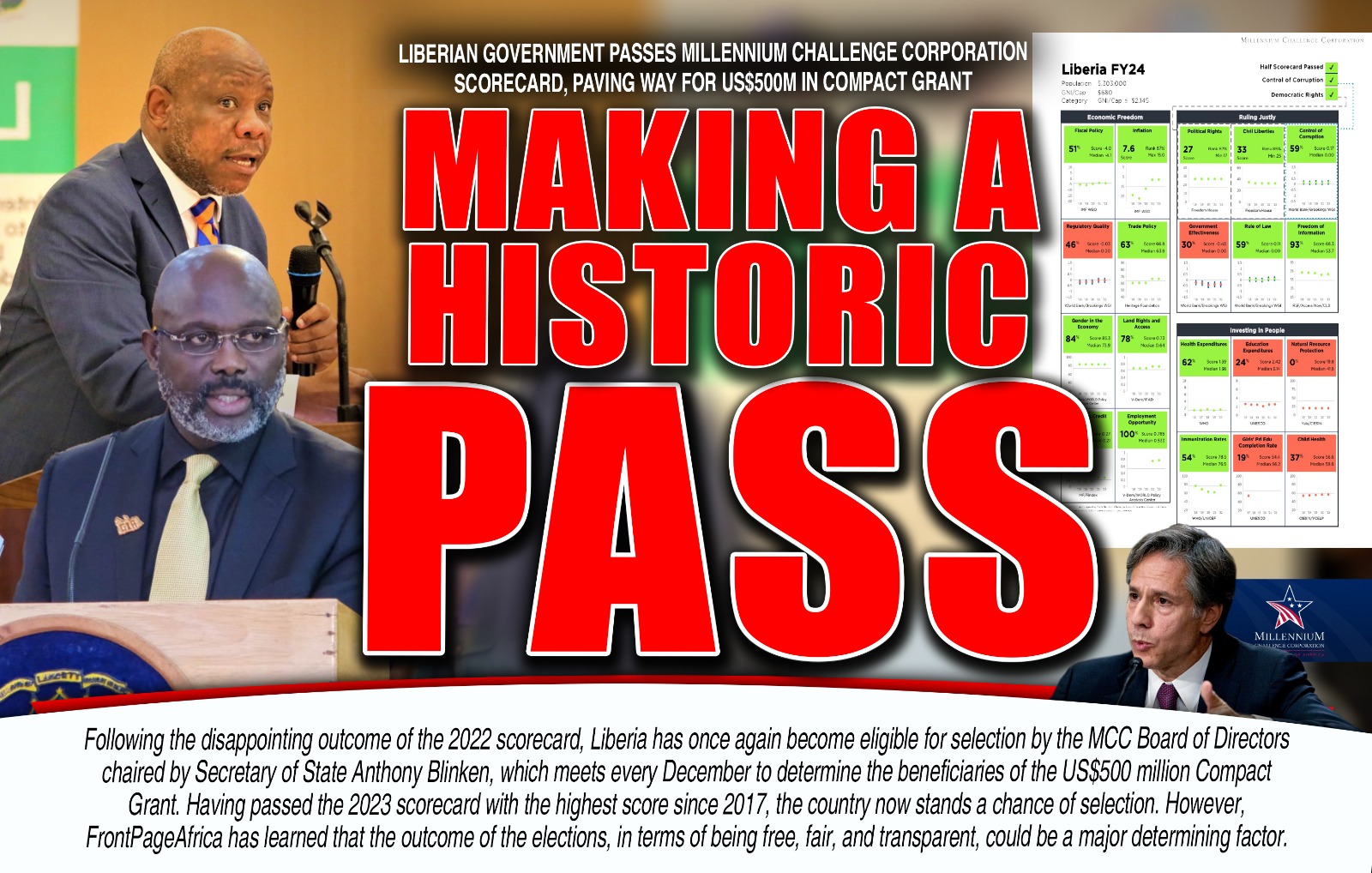The Liberian government, led by President George Manneh Weah, has successfully met the requirements of the Millennium Challenge Corporation (MCC) Scorecard.
MCC’s scorecards play an important role in the competitive selection process to determine which countries are eligible to establish a five-year grant agreement known as a compact.
A country is considered to have “passed” the scorecard when it fulfills at least 10 of the 20 indicators, which include the “Control of Corruption” indicator and either the “Civil Liberties” or “Political Rights” indicator.
In the 2024 fiscal year report released by the MCC, Liberia’s performance exceeded expectations by passing 14 of the 20 indicators. These 14 indicators encompassed various aspects, including fiscal policy, inflation, political rights, civil liberties, control of corruption, trade policy, rule of law, freedom of information, gender in the economy, land rights and access, health expenditures, access to credit, employment opportunities, and immunization rates.
This achievement marks a significant improvement compared to the previous year, where Liberia fell short in 11 indicators, including several of those successfully passed this year, such as “rule of law,” “trade policy,” “inflation,” “fiscal policy,” and “immunization rates.”
However, Liberia faced challenges in six indicators for the fiscal year 2024, including regulatory quality, government effectiveness, education expenditures, natural resource protection, the newly introduced girls’ primary education completion rate, and child health.
MCC’s Board Evaluation Criteria
MCC’s Board chaired by the Secretary of State, Anthony Blinken, evaluates candidate countries for compact eligibility based on three statutorily mandated factors: policy performance, the potential to reduce poverty and stimulate economic growth, and the availability of MCC funds. FrontPageAfrica gathered that Liberia’s selection would be determined by a number of factors, including the outcome of the election – beign free, fair and transparent.
Regarding policy performance, as previously mentioned, a country must pass at least 10 of the 20 indicators, including either a pass in the “Political Rights” or “Civil Liberties” indicator and the “Control of Corruption” indicator. However, achieving only half of the policy performance, as Liberia did for fiscal year 2024, does not automatically guarantee a grant. The board considers the country’s potential to reduce poverty and foster economic growth.
The Board’s assessment encompasses various information sources, such as the state of democratic and human rights, especially among vulnerable groups; civil society’s perspective on key governance issues; the state of corruption control and the rule of law; the potential for private sector investment and growth, both domestic and foreign; poverty levels within the country, and the country’s institutional capacity.
The third and final factor the Board considers when evaluating countries is the availability of funds. MCC’s budget is constrained and often specifically limited by legislative provisions. MCC has an ongoing portfolio of countries in various stages, including compact development, implementation, threshold programs, and program closure. Therefore, the Board must factor in MCC’s overall funding situation when making selection decisions for planned or existing programs.
What happen upon selection?
Upon selection by the MCC, a country becomes eligible for a compact and must undergo a compact development process which involves an economic constraints analysis to determine the binding constraint to economic growth which must be undertaken by a Core Team established by the selected country. The Constraints Analysis informs investment decision and amount of the MCC grant leading to the development of concept papers on selected projects for approval.
Additionally, the compact development process also includes rigorous stakeholder engagements, a beneficiary analysis, and an environmental and social analysis of projects. Upon approval of projects and budget, the eligible country enters into compact negotiations leading to the signing of the compact agreement between the US Government and the recipient country. This process can take up to two years, while a country must maintain a passing scorecard during the entire compact development period.
The MCC and Its Role in Liberia
The Millennium Challenge Corporation is an independent U.S. foreign aid agency established in 2004 under the leadership of Republican President George W. Bush. The agency’s mission is to foster economic growth, open up markets, and enhance living standards in select countries.
The MCC applies specific criteria to guide its work abroad, focusing on indicators that measure a country’s commitment to good governance, economic freedom, and investment in its citizens. Selected countries receive substantial grants to finance projects aimed at reducing poverty through sustainable economic growth. These projects typically involve infrastructure development, institutional reform, and the expansion of access to healthcare and education. MCC grants may complement other U.S. and international development programs. The MCC provides two primary types of grants: compacts and threshold programs.
Compacts are large, five-year grants awarded to countries that meet MCC’s eligibility criteria, while threshold programs are smaller grants provided to countries that come close to meeting these criteria and are dedicated to improving their policy performance.
Liberia has been benefiting from MCC support since July 2010 when a three-year, US$15 million threshold grant was launched. This program concluded in December 2013. In January 2016, the MCC and Liberia initiated a five-year, US$257 million compact aimed at spurring economic growth and poverty reduction in Liberia.
The primary focus of this compact was to address the lack of reliable and affordable electricity access in the country, as well as the poor quality of road infrastructure. A significant portion of the funding was allocated to the revival of the Mt. Coffee Hydro Power Plant, and the compact was successfully completed in January 2021.
Breaking Weah’s Compact Curse
The remarkable performance of the Weah administration for the fiscal year 2024 marks a significant turning point, breaking the chain of previous failures. Since its inception in 2017, the current administration has been actively pursuing a second compact. This latest MCC report provides a boost to Liberia’s prospects of re-entering the program. It comes at a crucial time as President Weah faces a tough re-election battle against his political rival, former Vice President Joseph Nyumah Boakai.
Source: Front Page Africa






